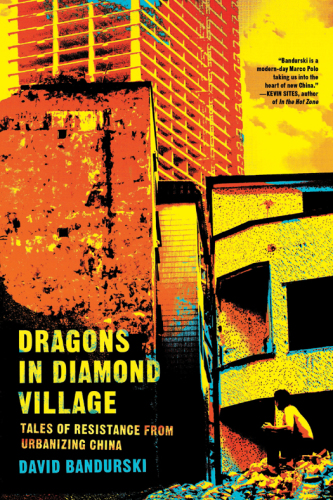
Dragons in Diamond Village
Tales of Resistance from Urbanizing China
کتاب های مرتبط
- اطلاعات
- نقد و بررسی
- دیدگاه کاربران
نقد و بررسی

August 1, 2016
Hong Kong–based journalist Bandurski explores corruption in Chinese society through a very specific lens: the phenomenon of once-rural villages being overtaken by rapidly expanding cities. The main narrative involves Xian Village, which was absorbed by Guangzhou, China’s third largest city. Set mainly between 2009 and 2014, this story involves village residents who refuse to sign demolition agreements to tear down their centuries-old homes, pitting them against the wishes of powerful locals. Bandurski weaves in other strands of resistance: a small businesswoman who finds herself entangled in an unsanctioned shopping center development and a rural villager who responds to losing his property rights in another village with protest. Bandurski also provides an impressive investigation into the convoluted trail of corruption at the heart of Xian Village’s troubles. The organizational principle undergirding the narrative’s interlocking pieces does not make itself readily apparent, and the jumps from scandal to scandal are discombobulating. Bandurski employs an engaging and clear voice that mixes the styles of reportage and memoir. At times, though, the writing includes too much reportorial detail when the reader hungers for deeper characterizations or more cultural context. The protagonists all read as noble ciphers standing up to indistinctly corrupt power. Nonetheless, the book provides an important and unique spotlight on the lives of those being run over roughshod by China’s development.

A grim investigation of how urbanization is destroying traditional Chinese communities.Journalist and documentarian Bandurski focuses on the phenomenon of "urban villages," rural spaces gentrified by land speculation and overbuilding. "The more I heard villagers talk about the community's history and troubles," he writes, "the more I was enchanted by what Xian [village] seemed to represent." The author is attuned to rural China's fragility, noting how community traditions conflict with rapacious, state-endorsed capitalism. "Behind [village] walls," he writes, "a bitter struggle was taking place: the villagers against the village leaders and their private army of thugs." Bandurski first establishes how, in and around cities like Guangzhou, "the scale of urbanisation...is so immense it beggars the imagination." He discerns deep corruption and state-sanctioned brutality couched in the ornate language of the modern Chinese state, where troublemakers are routinely accused of the ominous offense of "disrupting public order." The author tracks the stories of several individuals (whom he protects with pseudonyms) who invested their savings in new business developments only to be overwhelmed by shoddy construction and demands for kickbacks. One such impoverished woman's eventual suicide is depicted as "one of the most iconic tragedies of China's urbanisation drive." Contrastingly, he found that in these urban villages, a few well-connected families "ran the village as a private fiefdom, monopolising its business, politics, and security." In today's globalized China, he argues, "public 'success' cloaked [scandals] involving misappropriated land and purloined millions." Throughout, he emphasizes, he "was astonished" at the level of corruption he witnessed. Bandurski demonstrates a keen understanding of the traditional lifestyles under attack by enforced modernization, as in his use of the Dragon Boat ceremony as a framing device, representing the villagers' resilience. However, his overall narrative of civic corruption is harder to follow, with limited appeal for readers lacking familiarity with the arcane social structures of contemporary China. An intense look at globalization's tragic hidden costs. COPYRIGHT(1) Kirkus Reviews, ALL RIGHTS RESERVED.

October 1, 2016
The traditions and lifestyle in rural Chinese villages are often overshadowed by the extreme urban growth China is experiencing. Journalist Bandurski (editor, Univ. of Hong Kong's China Media Project) here describes the lives and struggles of Chinese villagers. The book depicts the interwoven relationship between history and culture. The author presents a series of stories from Xian Village in Southern China where villagers struggled to protect their land in the face of development. The title comes from a story of resistance during the Dragon Boat festival and because "the dragon is a symbol of courage, perseverance, strength and wisdom, of nation and community, of the endurance of the culture and the people." This accurately captures the image Bandurski paints of the people of Xian Village. The narratives are entertaining and often read more like a novel in which, by the end, readers feel like part of the village. VERDICT This well-written and entertaining book will appeal to many readers.--Casey Watters, Singapore Management Univ.
Copyright 2016 Library Journal, LLC Used with permission.

























دیدگاه کاربران